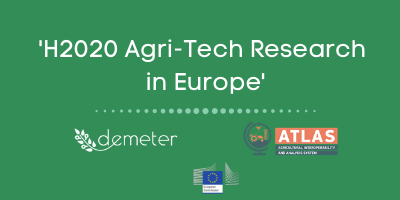
Introduction
Both the DEMETER and ATLAS project had committed to participate in several events such as Global IoT Week and the SmartAgriHubs event in Bucharest. However, with the onset of COVID-19, such events were cancelled. Therefore, the coordinators decided to run a joint webinar, with the support of the EU Commission, to promote both projects and engage the relevant target audiences.
Overview of Presentations
In total, 20 speakers participated in the webinar on ‘H2020 AgriTech Research in Europe’. The session was divided into three sessions beginning with an overview of emerging architectural approaches, implementation and standardisation. Following this how to engage real end users and stakeholders via a multi-actor approach was discussed. To finish, opportunities for new partners to join these exciting projects via cascade funding was outlined. The moderator for the day was Hazel Williams, Senior Strategic Business Partner (AGRI) at the Telecommunications Software and Systems Group (TSSG) in Waterford, Ireland.
Welcome
Mr. Joel Bacquet, EU Commission DG Connect and Dr. Doris Marquardt, EU Commission DG Agri formally opened the webinar. Mr Bacquet spoke about the challenges in deploying digital technologies in agriculture and the role of large-scale pilots to drive adoption. Dr. Marquardt presented on the multi-actor approach in agri-tech research and the relevance for policy developments and implementation.
Stefan Rilling, project coordinator of ATLAS and researcher at Fraunhofer IAIS delivered an overview of the ATLAS project and its goals to drive interoperability between agriculture machines, sensors and data services.
Kevin Doolin, project coordinator of DEMETER and Director of Innovation at the TSSG, outlined the DEMETER project and its aim to lead the digital transformation of Europe’s agri-food sector through the deployment of IoT technologies, data science and smart farming.
Reference Architecture and Standardisation
Prof Ioanna Roussaki Assistant Professor National Technical University of Athens and DEMETER WP2 leader on Data and Knowledge and the leader of the Task on the DEMETER Reference Architecture Design presented an overview of the DEMETER reference architecture.
Thanasis Poulakidas of INTRASOFT Intl and the Integration Manager of DEMETER outlined how DEMETER takes its Reference Architecture to provide a core reference implementation, in order to support its pilot implementations and beyond.
Volker Zippel of CLAAS Group and leader of the ATLAS WP3 in the name of the AEF (Agricultural Industry and Electronics Foundation) gave an overview of the ATLAS high level architecture.
Arne Berre from SINTEF spoke about the importance of standardisation and presented an overview of the DEMETER Standardisation Framework.
Multi Actor Eco System
Anja Linnemann, project and research manager at the Fraunhofer Institute for Applied Information Technology discussed the DEMETER multi-actor approach focusing on real life problems, co-creation and accepted and useful solutions.
Stefan Rilling presented the ATLAS multi-actor approach and described some of the piloting activity taking place on nutrient cycle balance, targeted application of plant protection, advanced irrigation management.
Grainne Dilleen of TSSG and PhD researcher funded by DEMETER outlined the informational, behavioural and social, business and economic, technological, and external factors impacting the farmer’s adoption of smart farming technologies.
Peter Frohlich from AgriCircle and ATLAS looked deeper into the technological factors impacting adoption with a focus on interoperability and data protection/privacy.
Mark Hoffman from Fraunhofer gave an overview of the ATLAS pilot project focusing on livestock behavioural analysis using image recognition. The pilot aims to ease the workload for livestock farmers and increase animal welfare.
Senka Gajinov from DunavNET & Tomo Popovic from University of Donja Gorica explained some of the pilot projects in DEMETER which are running in vineyards/orchards and poultry farms to create a trustable food production supply chain.
Karel Charvat from Lesprojekt presented the multi-actor approach in the Czech farm cluster and how some of the DEMETER technologies are being tested there.
Open Calls & Cascade Funding
Marianna Faraldi from Technalimenti spoke about the importance of driving collaboration in the agri-food sector and how OpenDei is an essential pillar in the implementation of EU digital projects, particularly large-scale pilots and platform projects.
Miguel Gonçalves from F6S presented the two Open Calls for DEMETER and outlined their goals in enabling the extension of the DEMETER technology offering beyond the consortium partners and supporting the deployment of new pilots in different geographic regions.
Tamara Naydenova from AZO detailed the ATLAS Open Calls which aim to develop new and innovative services by making use of the technical foundation of the ATLAS platform.
Harald Sundmaeker, ATB outlined the SmartAgriHubs Open Calls including the recent call; Respond, which was a call that was a direct response to the COVID-19 pandemic.
Staša Stojkov Rošić from BioSense Institute discussed the agROBOfood Open Calls which focus on industrial challenges and innovation experiments.



[…] exciting projects via cascade funding was outlined. More information on the webinar can be found here […]